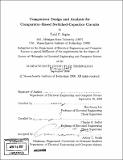Comparator design and analysis for comparator-based switched-capacitor circuits
Author(s)
Sepke, Todd C. (Todd Christopher), 1975-
DownloadFull printable version (12.71Mb)
Alternative title
Comparator design and analysis for CBSC
Other Contributors
Massachusetts Institute of Technology. Dept. of Electrical Engineering and Computer Science.
Advisor
Hae-Seung Lee and Charles G. Sodini.
Terms of use
Metadata
Show full item recordAbstract
The design of high gain, wide dynamic range op-amps for switched-capacitor circuits has become increasingly challenging with the migration of designs to scaled CMOS technologies. The reduced power supply voltages and the low intrinsic device gain in scaled technologies offset some of the benefits of the reduced device parasitics. An alternative comparator-based switched-capacitor circuit (CBSC) technique that eliminates the need for high gain op-amps in the signal path is proposed. The CBSC technique applies to switched-capacitor circuits in general and is compatible with most known architectures. A prototype 1.5 b/stage pipeline ADC implemented in a 0.18 [mu]m CMOS process is presented that operates at 7.9 MHz, achieves 8.6 effective bits of accuracy, and consumes 2.5 mW of power. Techniques for the noise analysis of comparator-based systems are presented. Non-stationary noise analysis techniques are applied to circuit analysis problems for white noise sources in a framework consistent with the more familiar wide-sense-stationary techniques. The design of a low-noise threshold detection comparator using a preamplifier is discussed. (cont.) Assuming the preamplifier output is reset between decisions, it is shown that. for a given noise and speed requirement, a band-limiting preamplifier is the lowest power implementation. Noise analysis techniques are applied to the prototype CBSC gain stage to arrive at, a theoretical noise power spectral density (PSD) estimate for the prototype pipeline ADC. Theoretical predictions and measured results of the input referred noise PSD for the prototype are compared showing that the noise contribution of the preamplifier dominates the overall noise performance.
Description
Thesis (Ph. D.)--Massachusetts Institute of Technology, Dept. of Electrical Engineering and Computer Science, February 2007. Includes bibliographical references (p. 177-182).
Date issued
2007Department
Massachusetts Institute of Technology. Department of Electrical Engineering and Computer SciencePublisher
Massachusetts Institute of Technology
Keywords
Electrical Engineering and Computer Science.